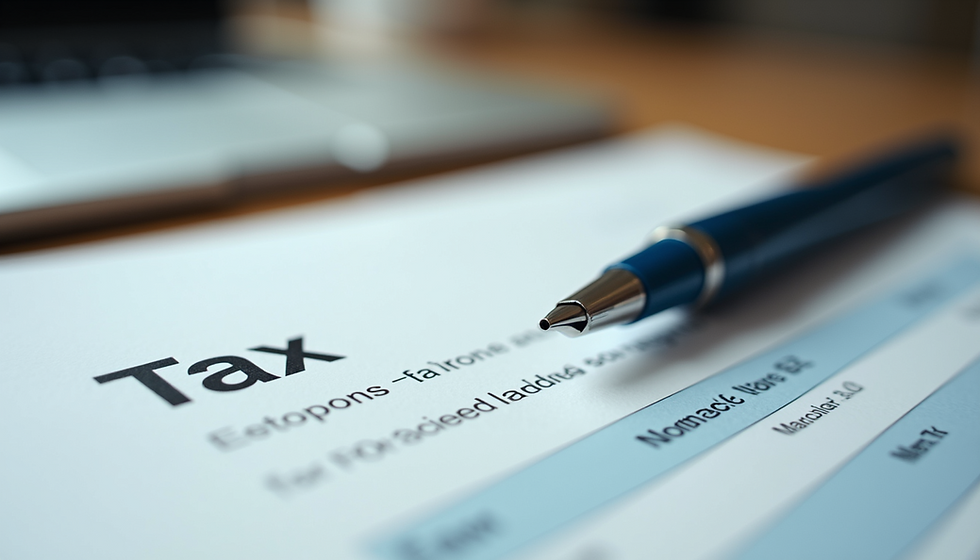What Is Self-Employment—and What Does It Mean for You?
- Eduard husaru
- Jun 25, 2025
- 3 min read
Updated: Jul 15, 2025
If you’ve started working as a sole trader, freelancing, selling handmade goods online, or earning through a side hustle, congratulations! You’re stepping into self-employment. This is a powerful move toward flexibility, independence, and creating something of your own. However, before you get swept up in your creative or business goals, it’s worth understanding what self-employment means—especially regarding your responsibilities.
Working for Yourself: The Basics
Self-employment means you are not on a company payroll. You decide when, how, and where you work. You find clients or customers, deliver your service or product, and get paid directly. No boss. No payslips. No built-in pension or sick pay either.
For many, it begins as a side hustle—a weekend gig, a freelance job, or a passion project that starts earning real income. But remember, as soon as you earn over £1,000 in a tax year from self-employment, you must register with HMRC.
Understanding Your Responsibilities
Once registered, you have specific obligations as a self-employed individual. Tax compliance is key. You’ll need to familiarize yourself with the rules and requirements.
The initial phase includes:
Learning about Self Assessment, which requires you to file a tax return each year, reporting your income and expenses. HMRC uses this information to calculate how much tax you owe.
Understanding Income Tax: You’ll need to pay tax on your profits, not your total income. For instance, if you earn £10,000 and spend £3,000 on business costs, you’re only taxed on £7,000.
It's essential to grasp these concepts early on to ensure compliance and avoid surprises.
Self-Employment & Tax: What You Need to Know
Even part-time freelancers and hobby sellers need to understand their tax obligations. Here’s an overview:
National Insurance Contributions (NICs): Once your profits pass specific thresholds, you’ll owe Class 2 and possibly Class 4 NICs. It’s crucial to keep track of your earnings.
Value Added Tax (VAT): If your turnover exceeds £90,000 in a 12-month period, you’ll need to register for VAT. This registration can significantly impact your pricing and accounting.
Payments on Account: If your tax bill is over £1,000, you might have to make advance payments toward the following year’s tax. This can be surprising if unprepared!
Making Tax Digital (MTD): Digital record-keeping and software are becoming essential. MTD for Income Tax will soon make quarterly submissions the norm. It’s vital to stay updated on these changes.
How to Set Yourself Up for Success
Self-employment is a rewarding path. However, handling your tax correctly from the start makes all the difference. Whether you’re testing a side project or building a full-time business, clear guidance can save you time, stress, and money.
Key Steps to Consider
Create a Business Plan: Define your goals, target audience, and marketing strategy. This plan acts as a roadmap for your business.
Set Up Separate Finances: Open a separate bank account for your business transactions. This practice simplifies tracking income and expenses.
Invest in Accounting Software: Choose an accounting program to streamline financial tracking. This can help with invoicing and maintaining accurate records.
Stay Informed: Keep up with tax regulations and any changes that may impact you. Knowledge is power in self-employment.
Network with Other Self-Employed Individuals: Connect with others in your field. Sharing experiences and advice can provide valuable insights.
Need Help? We're Here for You!
If you require assistance registering with HMRC, understanding what counts as a business expense, or preparing for your first tax return, I offer tailored support for sole traders, construction workers, freelancers, creators, and small business owners. I’ll help make it easy to stay compliant while you focus on what you do best.
Reach out today to get started:
Email: info@accounted4tax.co.uk
WhatsApp: 07563811938
Phone/TM: 07563811938



Comments